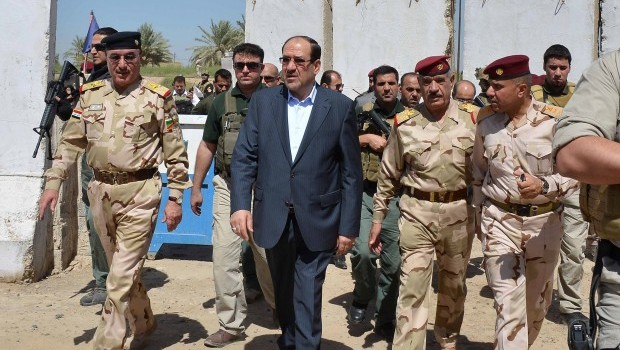
A handout picture released by the Iraqi prime minister’s media office shows Iraqi Prime Minister Nuri Al-Maliki touring military posts in the outskirts of Baghdad on August 6, 2013. (AFP Photo/HO/Iraqi Prime Ministers Office)
Baghdad, Asharq Al-Awsat—Iraqi Prime Minister Nuri Al-Maliki has announced that the government intends to integrate members of the Anbar tribes into the army and police force.
In a statement earlier this week, Maliki confirmed that the Anbar tribes fighting alongside government forces against Al-Qaeda-affiliated militants in the region will be integrated into the state security apparatus.
Portraying the situation in Iraq’s restive western province as having been resolved, Maliki said: “Victory over the terrorists would not have been possible were it not for the unity of the local government in Al-Anbar and its tribes, and the bravery of the Iraqi army.”
He said: “All residents of the province succeeded in defeating the terrorist groups and cleansing the city of Ramadi and other cities from these murderous criminals,” adding that “the government respects the plans and initiatives which the Al-Anbar leadership and tribes have proposed.”
Sporadic clashes were reported in Ramadi on Tuesday, while eyewitnesses reported that masked and armed Al-Qaeda fighters had established checkpoints at Fallujah’s main intersections and were checking the IDs of passers-by. North of Baghdad, 21 militants were reported killed at a terrorist training camp on Monday when an instructor teaching his militant recruits how to make car bombs accidentally set off explosives in his demonstration.
Maliki said: “The government will work in collaboration with everyone to implement these initiatives, renew the determination to support the tribes who rose up against terrorism, and integrate their members into the army and police forces.”
Maliki also announced that “the requisite funds will be made available to compensate those who suffered damage to their properties and possessions, honor martyrs and their families, and to rebuild the province and implement basic reforms in the security forces to instill security and stability, and restore normal life to the province.”
The parliamentary National Reconciliation Committee also endorsed the steps. Iraqiya List MP Qais Al-Shadhar told Asharq Al-Awsat: “The committee supports these steps by the government because they are part of the protesters’ demands. These measures could also serve to activate the articles of national reconciliation.”
“What is important is turning these decisions into reality on the ground because there are those within government departments who do not support them and may seek to interrupt or postpone them.”
The Baghdad Belt Committee, however, said: “The response shown by the government to the demands of the people of the tribes has begun to affect life in the Baghdad belt area, which, until recently, was one of the tensest areas of the capital.”
Leader of the Baghdad Belt League, Eyad Al-Jubouri, told Asharq Al-Awsat: “The government’s decision to integrate members of Al-Anbar province who fought Al-Qaeda and ISIS should have a positive effect on security and stability not only in Al-Anbar, but all areas around Baghdad.”
Jubouri said: “Many areas that form the Baghdad Belt are now completely stable, except some areas close to Al-Karma in Fallujah and Al-Tarmiyah north of Baghdad, as well as parts of Abu Ghraib.”
“Decisions such as this prove the seriousness of the government in dealing with the issue of demonstrations and protests, which is one of the issues that must be dealt with wisely and patiently,” he added.
